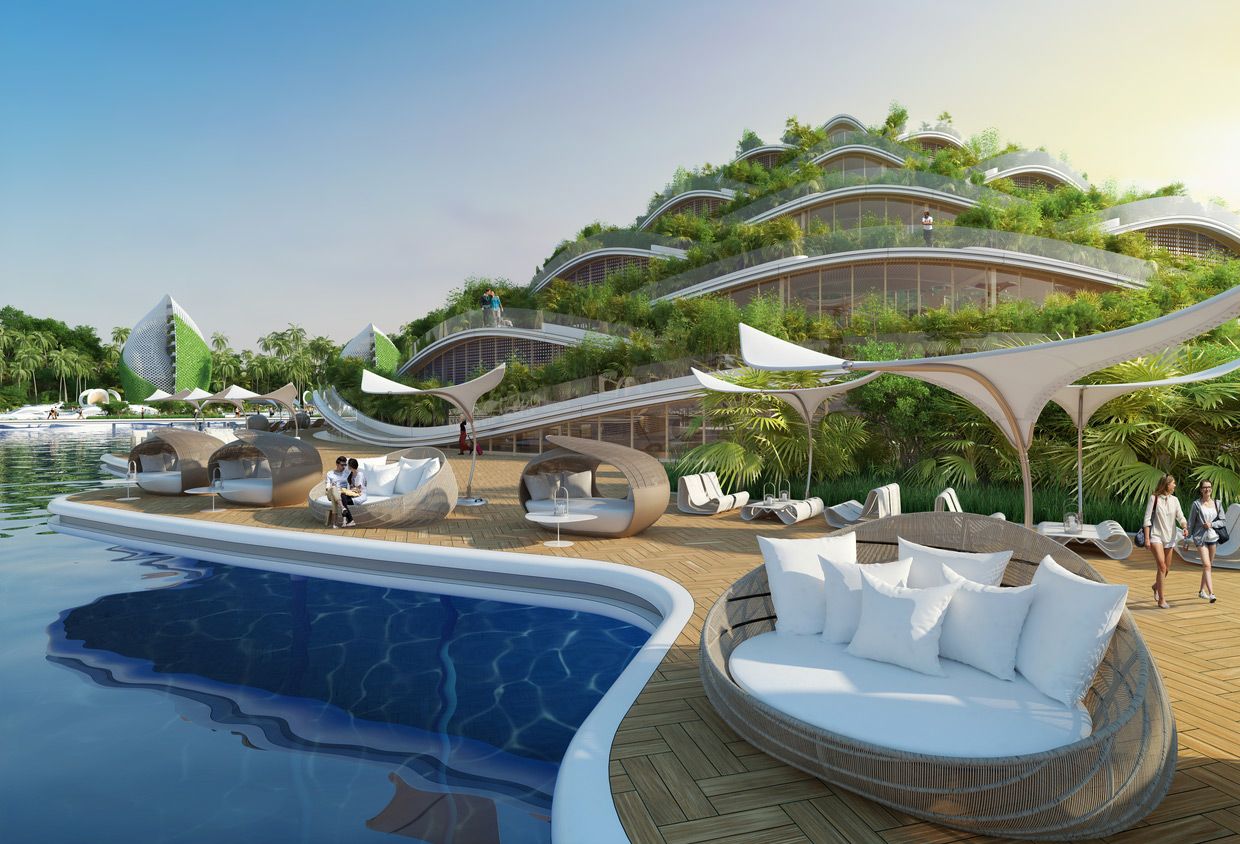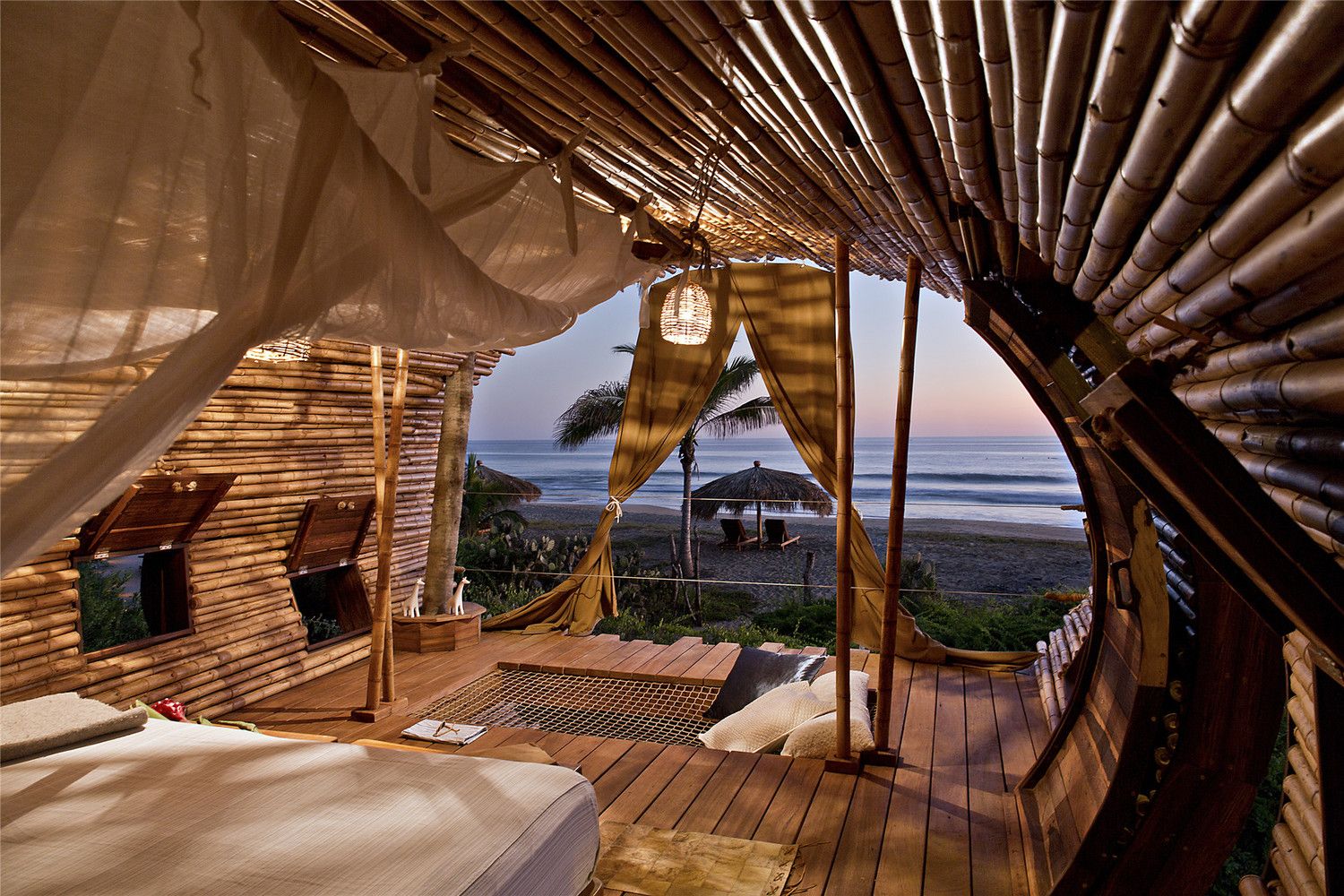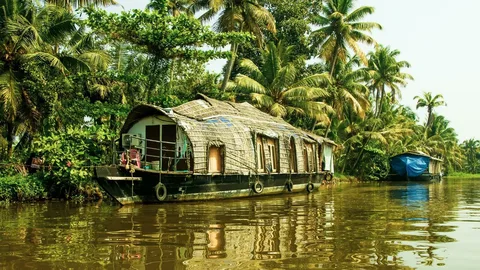Travel & Hospitality
Sustainable Accommodations Eco-Friendly Hotels and Resorts

In recent years, the hospitality industry has witnessed a paradigm shift towards sustainability, driven by growing environmental awareness and consumer demand for responsible travel options. Sustainable accommodations, particularly Eco-friendly hotels and resorts have emerged as a significant trend within this context. These establishments not only offer luxurious and comfortable stays but also prioritize environmental stewardship and social responsibility. This article explores the various dimensions of sustainable accommodations, focusing on the principles, practices, and benefits of Eco-friendly hotels and resorts.
Rise of Sustainable Travel
The travel and tourism sector is one of the largest industries globally, contributing significantly to economic growth and job creation. However, it also has a substantial environmental footprint, including carbon emissions, water consumption, and waste generation. As travelers become more conscious of their environmental impact, there is a growing demand for sustainable travel options. This shift has led to the rise of Eco-friendly hotels and resorts, which aim to minimize their ecological footprint while providing exceptional guest experiences.

Image by yandex.com
Defining Sustainable Accommodations
Sustainable accommodations refer to lodgings that implement environmentally friendly practices to reduce their impact on the planet. These practices encompass a wide range of initiatives, from energy and water conservation to waste reduction and sustainable sourcing of materials. Eco-friendly hotels and resorts go beyond mere compliance with environmental regulations; they actively seek to innovate and integrate sustainability into every aspect of their operations.
Principles of Sustainable Accommodations
Environmental stewardship is at the core of sustainable accommodations. Eco-friendly hotels and resorts adopt various strategies to minimize their environmental impact, including:
Energy Efficiency:** Utilizing energy-efficient lighting, heating, and cooling systems to reduce energy consumption.
Renewable Energy:** Incorporating renewable energy sources such as solar, wind, and geothermal power.
*Water Conservation:** Implementing water-saving fixtures, rainwater harvesting, and greywater recycling systems.
Waste Management:** Reducing, reusing, and recycling waste materials to minimize landfill contributions.
Sustainable Building Practices:** Using eco-friendly construction materials and designing buildings to maximize natural light and ventilation.
Social Responsibility
Sustainable accommodations also emphasize social responsibility, recognizing the importance of supporting local communities and promoting cultural heritage. Key practices include:
*Local Sourcing:** Procuring food, materials, and services from local suppliers to support the local economy and reduce transportation emissions.
– **Fair Labor Practices:** Ensuring fair wages, safe working conditions, and opportunities for professional development for employees.
– **Community Engagement:** Collaborating with local communities on conservation projects, cultural preservation, and educational initiatives.
– **Cultural Sensitivity:** Promoting and respecting local traditions, customs, and heritage.
Economic Viability
For sustainable accommodations to be successful, they must also be economically viable. This involves balancing environmental and social initiatives with financial performance. Strategies include: Cost Savings:** Reducing operational costs through energy and water efficiency, waste reduction, and sustainable sourcing.Brand Differentiation:** Attracting environmentally conscious travelers by promoting sustainability credentials. Long-Term Investment:** Investing in sustainable technologies and practices that yield long-term benefits and resilience.
Practices of Eco-Friendly Hotels and Resorts
Eco-friendly hotels and resorts often incorporate green building design principles to enhance sustainability. Key features include:*LEED Certification:** Achieving Leadership in Energy and Environmental Design (LEED) certification for sustainable building practices. Passive Design:** Utilizing natural light, ventilation, and thermal mass to reduce energy consumption. Green Roofs and Walls:** Installing vegetation on roofs and walls to improve insulation, reduce heat island effect, and enhance biodiversity.
Energy and Water Management
Effective energy and water management are critical components of sustainable accommodations. Practices include*Energy-Efficient Appliances:** Installing energy-efficient appliances and systems, such as LED lighting, smart thermostats, and high-efficiency HVAC systems. Renewable Energy Systems:** Integrating solar panels, wind turbines, and geothermal systems to generate clean energy on-site.
*Water-Saving Fixtures:** Using low-flow faucets, showerheads, and toilets to reduce water consumption.*Rainwater Harvesting:** Collecting and storing rainwater for irrigation and non-potable uses. Greywater Recycling:** Treating and reusing greywater from sinks, showers, and laundry for landscaping and other purposes.
Waste Reduction and Recycling
Minimizing waste and promoting recycling are essential for eco-friendly hotels and resorts. Key initiatives include:Waste Audits:** Conducting regular waste audits to identify opportunities for reduction and improvement. Composting:** Implementing composting programs for organic waste, such as food scraps and garden clippings. Recycling Programs:** Providing recycling bins and educating guests and staff on proper recycling practices.
Sustainable Sourcing and Procurement
Sustainable accommodations prioritize responsible sourcing and procurement to support environmental and social goals. Practices include *Local and Organic Food:** Sourcing food from local, organic, and sustainable farms to reduce carbon footprint and support local agriculture.Eco-Friendly Products:** Using eco-friendly cleaning products, toiletries, and amenities that are biodegradable and non-toxic.Fair Trade and Ethical Suppliers:** Partnering with suppliers that adhere to fair trade and ethical labor practices.
Guest Engagement and Education
Eco-friendly hotels and resorts recognize the importance of engaging and educating guests on sustainability. Initiatives include:Sustainability Programs:** Offering programs and activities that promote environmental awareness, such as nature walks, wildlife conservation tours, and eco-workshops.Green Certifications:** Displaying green certifications and awards to highlight sustainability achievements.Guest Communication:** Providing information on sustainable practices and encouraging guests to participate in conservation efforts, such as towel and linen reuse programs.

Image by yandex.com
Benefits of Sustainable Accommodations
The environmental benefits of sustainable accommodations are significant and far-reaching. These include*Reduced Carbon Footprint:** Lower energy consumption and increased use of renewable energy reduce greenhouse gas emissions.
– **Conservation of Natural Resources:** Efficient water and waste management practices conserve valuable natural resources.
– **Biodiversity Preservation:** Sustainable landscaping and habitat restoration efforts support local wildlife and biodiversity.
Social Benefits
Sustainable accommodations also generate positive social impacts, including:Community Empowerment:** Supporting local economies and providing employment opportunities for local residents*Cultural Preservation:** Promoting and preserving local cultural heritage and traditions.Enhanced Guest Experience:** Offering unique and meaningful experiences that connect guests with nature and local communities.
Economic Benefits
From an economic perspective, sustainable accommodations offer several advantages:Cost Savings:** Reduced operational costs through energy and water efficiency, waste reduction, Increased Revenue:** Attracting environmentally conscious travelers and enhancing brand reputation.Long-Term Resilience:** Building resilience to environmental and economic challenges through sustainable practices.
Conclusion
Sustainable accommodations, particularly eco-friendly hotels and resorts, represent a growing and essential trend in the hospitality industry. By prioritizing environmental stewardship, social responsibility, and economic viability, these establishments are setting new standards for responsible travel. As the demand for sustainable travel options continues to rise, eco-friendly hotels and resorts will play a crucial role in shaping the future of the hospitality industry, offering guests memorable and meaningful experiences while safeguarding the planet for future generations.
Art /Entertainment
Homestays in Kasaragod: Backwaters, Beaches, and Tranquility

Introduction
If you are looking for a calm and refreshing escape in northern Kerala, choosing a homestay in Kasaragod is one of the best ways to experience true serenity. Kasaragod is famous for its pristine beaches, picturesque backwaters, undulating hills, and serene village life. Unlike more commercial tourist hubs, this district offers a slower pace, making it perfect for travelers who value privacy, nature, and authentic hospitality.
A homestay allows you to experience Kerala beyond sightseeing. You wake up to fresh air, enjoy home-cooked meals, and connect with local families who warmly welcome guests into their homes. The peaceful environment, combined with genuine hospitality, creates a memorable stay.
Why Kasaragod Is Ideal for a Peaceful Stay
Kasaragod blends coastal charm with rural beauty. Attractions such as Bekal Fort, Valiyaparamba Backwaters, and Ranipuram Hills add to the district’s appeal. However, what truly makes Kasaragod special is its calm atmosphere. The beaches are less crowded, the countryside remains green and open, and traditional homes maintain their heritage character.
Most homestays are located in serene setting near beaches, backwaters, or plantations offering guests quiet mornings and relaxing evenings. The absence of heavy commercialization ensures a tranquil experience.

Best Homestays in Kasaragod for a Relaxing Experience
When searching for the best homestays in Kasaragod, consider properties that focus on natural surroundings, personal care, and traditional architecture. Here are the types of homestays that offer a peaceful Kerala stay:
1. Backwater Homestays
Homestays near Valiyaparamba Backwaters provide calm water views and a soothing atmosphere. Guests can enjoy canoe rides, sunset views, and fresh seafood prepared in traditional Kerala style. The quiet surroundings make these stays ideal for couples and nature lovers.
2. Beachside Homestays Near Bekal
Beachside homestays near Bekal offer easy access to quiet shorelines without the rush of large resorts. Morning walks along the beach and evening views of the sea create a deeply relaxing experience. These homestays often provide spacious rooms and open verandas where guests can unwind.
3. Plantation and Countryside Homestays
For those who prefer greenery, plantation homestays in areas like Nileshwar and Badiadka offer a refreshing escape. Enclosed by coconut palms, areca nut plantations, and rice paddies, these residences enable visitors to reconnect with the natural world. Some hosts even introduce visitors to farming activities and local village life.
What Makes Homestays in Kasaragod So Peaceful?
Personalized Hospitality
Hosts treat guests like family rather than customers. This personal attention ensures comfort and creates a welcoming environment.
Authentic Kerala Cuisine
Most homestays serve freshly prepared meals made from local ingredients. Traditional dishes such as appam, fish curry, puttu, and vegetable curries are often part of the experience.
Natural Surroundings
Whether near hills, backwaters, or beaches, homestays in Kasaragod are usually surrounded by greenery and open spaces. The quiet rural setting enhances relaxation.
Less Crowd and Noise
Kasaragod remains relatively untouched compared to major tourist centers. This means fewer crowds, less traffic, and more privacy.
Activities to Enjoy During Your Stay
A peaceful stay does not mean limited activities. You can explore historic forts, take boat rides in the backwaters, trek in the hills, or simply relax in a garden with a book. Village walks and interactions with locals offer insight into Kerala’s traditions and lifestyle.
If you prefer a slow holiday, you can spend your time enjoying sunsets, tasting local cuisine, and appreciating the natural surroundings.
Best Time to Visit
The ideal time to visit Kasaragod is between October and March when the weather is pleasant and comfortable. Monsoon season also brings lush greenery and fewer tourists, making it suitable for those seeking extra solitude.
Tips for Choosing the Right Homestay
- Select a location based on your preference—beach, backwater, or countryside.
- Read guest reviews to understand service quality.
- Confirm meal arrangements and amenities.
- Check accessibility and transport options if the property is remote.
Clear communication with your host ensures a smooth and satisfying stay.
Frequently Asked Questions (FAQ)
1. What makes homestays in Kasaragod different from hotels?
Homestays in Kasaragod offer a more personal and culturally immersive experience compared to hotels. Guests stay with local families, enjoy home-cooked meals, and experience daily life in a traditional Kerala setting.
2. Are homestays in Kasaragod suitable for families?
Yes, homestays in Kasaragod are ideal for families. Many properties offer spacious rooms, safe surroundings, and a peaceful environment perfect for children and elders.
3. Do homestays in Kasaragod provide meals?
Most homestays in Kasaragod provide traditional Kerala meals, either included in the package or available on request. It is always recommended to confirm meal options while booking.
4. Are homestays in Kasaragod safe for solo travelers?
Yes, homestays in Kasaragod are generally safe for solo travelers. Hosts maintain a secure and welcoming atmosphere, making guests feel comfortable and cared for.
5. What is the average cost of homestays in Kasaragod?
The price of homestays in Kasaragod varies depending on location, amenities, and season. However, they are usually affordable compared to resorts and hotels, offering good value for money.
Development
Dubai Visa Consultancy: Your Guide to Seamless Applications

Dubai is a city full of opportunities. People from different countries live and work here. Many residents in Dubai plan to study abroad, work overseas, or apply for immigration programs. However, visa procedures can be confusing and full of paperwork. This is where professional visa consultancy services in Dubai become very helpful.
If you are searching for the best immigration consultants in Dubai or a trusted visa expert in Dubai, this guide will help you understand everything in simple and clear language.
What Are Visa Consultancy Services in Dubai?
- Student visas
- Work visas
- Immigration visas
- Visit visas
- Business visas
The best immigration consultants in Dubai guide applicants step by step. They explain the rules, prepare documents, and help avoid mistakes.
A qualified visa expert in Dubai understands embassy procedures and keeps updated with changing immigration policies.

Why People Need Visa Consultancy Services
Applying for a visa is not always easy. Every country has its own rules. Some countries require interviews, while others ask for financial proof, medical tests, or background checks.
Here are some reasons people choose the best immigration consultants in Dubai:
- Complex documentation requirements
- Changing immigration laws
- Fear of rejection
- Lack of knowledge about procedures
- Time saving support
A professional visa expert in Dubai ensures that your application is complete and properly prepared.
Types of Visa Services Available
Visa consultancy services in Dubai usually cover many categories.
1. Student Visa Services
Students who want to study abroad often need help with:
- University admission
- Document preparation
- Visa filing
- Interview preparation
The best immigration consultants in Dubai guide students from admission to visa approval.
2. Work Visa Services
Professionals planning to work abroad need:
- Job offer verification
- Employment contracts
- Visa documentation
- Embassy submission
A visa expert in Dubai checks all documents carefully to avoid delays.
3. Immigration and PR Services
Some people want permanent residency in countries like Canada, Australia, or Europe. The best immigration consultants in Dubai help with:
- Eligibility assessment
- Points calculation
- Application submission
- Follow up with immigration authorities
Immigration cases require special knowledge, so guidance from a visa expert in Dubai is important.
How to Choose the Best Immigration Consultants in Dubai
Not all consultants offer the same quality of service. Before selecting, consider these factors:
Experience
Choose consultants with years of experience in handling different visa categories.
Transparency
The best immigration consultants in Dubai provide clear fee structures without hidden charges.
Updated Knowledge
Immigration laws change frequently. A professional visa expert in Dubai stays updated with new regulations.
Positive Reviews
Check client reviews and success stories before making a decision.
Step by Step Visa Application Process
Although each country has different rules, the general process looks like this:
Step 1: Initial Consultation
You meet with a visa expert in Dubai to discuss your goals.
Step 2: Eligibility Assessment
Consultants check if you meet the visa requirements.
Step 3: Document Preparation
All documents are prepared and verified carefully.
Step 4: Application Submission
Your application is submitted to the relevant embassy or immigration authority.
Step 5: Interview or Biometrics
If required, you attend an interview or provide biometric data.
The best immigration consultants in Dubai guide you during every step.
Common Mistakes to Avoid
Many applicants make simple mistakes, such as:
- Submitting incomplete forms
- Providing incorrect financial statements
- Missing deadlines
- Not preparing for interviews
These mistakes can cause delays or visa rejection. A visa expert in Dubai helps reduce such risks.
Benefits of Hiring a Visa Expert in Dubai
There are many benefits of working with professionals:
1. Time Saving
Consultants handle paperwork efficiently.
2. Reduced Stress
You feel confident knowing experts are guiding you.
3. Accurate Documentation
The best immigration consultants in Dubai ensure documents meet embassy standards.
4. Professional Advice
A visa expert in Dubai can suggest suitable visa options based on your profile.
Student and Family Visa Support
Many families living in Dubai apply for dependent visas or student visas together. Visa consultancy services in Dubai assist with:
- Family sponsorship
- Dependent visa filing
- Student guardian visas
The best immigration consultants in Dubai understand family-based applications and guide accordingly.
Importance of Financial Documentation
Most visa applications require proof of financial stability. This may include:
- Bank statements
- Salary certificates
- Tax returns
- Sponsorship letters
A visa expert in Dubai ensures financial documents are organized properly to meet embassy requirements.
Interview Preparation and Guidance
Some countries require visa interviews. Proper preparation is very important.
The best immigration consultants in Dubai provide:
- Mock interview sessions
- Common question practice
- Guidance on body language
- Confidence-building tips
A trained visa expert in Dubai helps applicants present their case clearly and honestly.
Keeping Up with Changing Immigration Laws
Visa rules can change suddenly due to:
- Policy updates
- Political changes
- New immigration programs
- Security regulations
The best immigration consultants in Dubai stay informed about such changes and guide clients accordingly.
A knowledgeable visa expert in Dubai regularly checks official embassy updates to avoid outdated information.
Ethical and Professional Practices
Reliable visa consultancy services in Dubai follow ethical standards. They:
- Do not guarantee visas
- Provide honest assessments
- Avoid fake documentation
- Respect client privacy
Choosing the best immigration consultants in Dubai means choosing transparency and professionalism.
Final Thoughts
Visa consultancy services in Dubai play an important role in helping students, professionals, and families achieve their international goals. Whether you plan to study abroad, work overseas, or apply for immigration, expert guidance can make the process easier.
The best immigration consultants in Dubai provide structured support, clear communication, and updated knowledge of visa regulations. A qualified visa expert in Dubai helps applicants avoid mistakes and prepare strong applications.
Before choosing a consultant, research carefully, ask questions, and ensure transparency. With proper guidance and preparation, your journey toward international education, career, or immigration can become smooth and successful.
Art /Entertainment
Coral Drive Villas Chennai: Beachfront Luxury on ECR

Finding the perfect beach getaway can feel overwhelming. However, Coral Drive Villas on East Coast Road (ECR), Chennai, makes that choice simple. This private collection of beach house villas offers a peaceful and luxurious stay close to the sea. Guests enjoy comfort, privacy, and direct beach access, all in one place.
Coral Drive launched in 2021 and quickly gained attention from travelers. Since then, it has welcomed guests from different backgrounds. Many visitors return because they love the calm atmosphere and premium experience. Whether you want a relaxing weekend or a lively gathering, Coral Drive offers something for everyone.
Sea Breeze Villa: Where Luxury Meets the Ocean
Sea Breeze stands out as one of the most premium villas at Coral Drive. It sits along ECR, about 10 kilometers before Mahabalipuram. This location offers stunning ocean views while keeping you away from city noise. As a result, guests enjoy both beauty and peace.
The villa features a wide panoramic view of the sea. You can also spot scattered rocks along the shoreline, which add to the natural charm. At the same time, the property remains private and quiet. This balance creates the perfect setting for relaxation.
Sea Breeze works well for many occasions. You can plan a family trip, a small gathering, or even a corporate meet-up. The villa accommodates up to 12 guests comfortably. It includes three spacious bedrooms, and each room offers a beautiful pool or sea view.
The design of the villa enhances the overall experience. A large swimming pool becomes the highlight of the space. Inside the pool, you will find a wooden swing that adds a unique touch. Many guests love this feature because it looks great in photos. In addition, the villa includes several cozy corners that feel perfect for relaxing or capturing memories.
Inside, the villa provides all essential amenities. You get a TV, secure parking, and a modular kitchen. The living room feels spacious and welcoming, which makes it ideal for group stays.
The terrace garden adds even more value. It offers a breathtaking view of the ocean. Guests often use this space for private parties and celebrations. The terrace can host around 20 to 35 people, which makes it perfect for birthdays, small events, or casual gatherings.

BareFoot Bay I: Comfort with Direct Beach Access
BareFoot Bay I offers a cozy and fully furnished beach villa experience. It provides direct access to the beach, which makes it ideal for travelers who love the sea.
The villa includes two bedrooms and two bathrooms. It also features a comfortable living area and a fully equipped kitchen. In addition, guests can enjoy a private balcony and terrace.
The location feels calm and pleasant. You can relax without distractions, yet still enjoy modern comforts. Each bedroom includes air conditioning, which ensures a comfortable stay in all seasons. A Smart TV with DTH keeps you entertained during your downtime.
The interiors feel bright and cheerful. This design creates a welcoming atmosphere for guests. At the same time, private parking adds convenience. Overall, BareFoot Bay I combines simplicity with comfort, making it a great choice for small families or groups.
BareFoot Bay II: Private Pool and Modern Living
BareFoot Bay II offers a more upgraded experience with a private swimming pool. This villa suits guests who want both luxury and privacy.
The property includes two bedrooms and two bathrooms. It also features a spacious living room and a fully equipped kitchen. Guests can relax on the private terrace or enjoy the balcony view.
This villa works well for couples, families, or friends. Its beachside location allows easy access to the shore. At the same time, the private pool adds an exclusive touch to your stay.
The villa includes air conditioning and a Smart TV for entertainment. The kitchen comes with all necessary equipment, which allows guests to cook their own meals. In addition, secure parking ensures a hassle-free experience.
BareFoot Bay II creates the perfect environment to relax and connect with nature. It blends comfort, style, and convenience in one space.
BareFoot Bay III: A Premium Coastal Retreat
BareFoot Bay III takes the experience to the next level. This villa combines elegance, privacy, and modern design. Guests enjoy access to a private beach as well as a shared swimming pool.
The villa includes two bedrooms, two bathrooms, and a spacious living area. It also features a well-equipped kitchen, a private terrace, and a balcony. Every detail focuses on comfort and functionality.
The location enhances the overall experience. Situated in a gated community on ECR, the villa offers both safety and exclusivity. At the same time, it remains close to popular spots like the Crocodile Park and Park Grand Sheraton.
This villa suits both short stays and longer vacations. Guests can relax, unwind, and enjoy the beauty of the coastline. Whether you travel as a couple or with family, BareFoot Bay III offers a memorable stay.
Why Choose Coral Drive Villas?
Coral Drive Villas stand out for many reasons. First, they offer direct beach access, which enhances your experience. Second, each villa provides privacy and comfort. Third, the design focuses on both style and practicality.
In addition, these villas suit different needs. You can plan a weekend escape, a celebration, or even a work retreat. The flexible spaces allow you to create your own experience.
Moreover, the villas include modern amenities. Guests enjoy clean spaces, secure parking, and fully equipped kitchens. These features make every stay smooth and convenient.
Important Guidelines for Guests
To ensure a pleasant stay, guests should follow a few simple rules. Check-in starts at 1 PM, while check-out ends at 11 AM. The team prepares each villa carefully before arrival, so timing matters.
Guests should avoid smoking or drinking inside rooms. However, they can enjoy these activities in designated outdoor areas. The private beach remains accessible from 5 AM to 10 PM.
Pool access varies depending on the day. During weekdays, guests can use the pool for two hours. On weekends, access ranges between one to two hours.
Meals are not included, but guests can order food online or from nearby restaurants. The villa provides menus and contact details for convenience.
Guests must also provide a valid government ID before arrival. Upon check-in, they need to show proof of booking. The villas follow a self-check-in system, so guests should leave the key at the door during check-out.
Pets are not allowed, but free private parking is available.
Final Thoughts
Coral Drive Villas offers more than just accommodation. It creates a complete beachside experience. Each villa combines comfort, privacy, and modern style. At the same time, the natural surroundings add peace and beauty.
f you want a relaxing escape near Chennai, Coral Drive Villas is an excellent choice. Whether you choose Sea Breeze or BareFoot Bay, you will enjoy a stay that feels both luxurious and memorable.
-
Business3 years ago
Cybersecurity Consulting Company SequelNet Provides Critical IT Support Services to Medical Billing Firm, Medical Optimum
-
Business3 years ago
Team Communication Software Transforms Operations at Finance Innovate
-
Business3 years ago
Project Management Tool Transforms Long Island Business
-
Business2 years ago
How Alleviate Poverty Utilized IPPBX’s All-in-One Solution to Transform Lives in New York City
-
health3 years ago
Breast Cancer: The Imperative Role of Mammograms in Screening and Early Detection
-
Sports3 years ago
Unstoppable Collaboration: D.C.’s Citi Open and Silicon Valley Classic Unite to Propel Women’s Tennis to New Heights
-
Art /Entertainment3 years ago
Embracing Renewal: Sizdabedar Celebrations Unite Iranians in New York’s Eisenhower Park
-
Finance3 years ago
The Benefits of Starting a Side Hustle for Financial Freedom






























